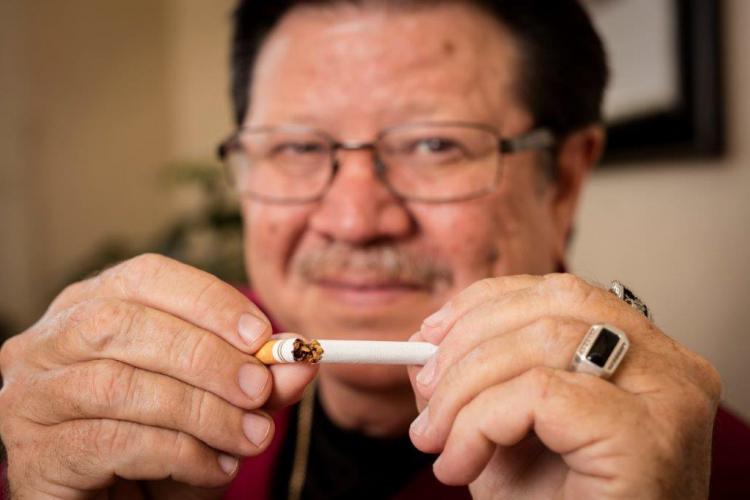
The percentage of Americans who smoke cigarettes has fallen to an all-time low, according to the Centers for Disease Control and Prevention.
Mark Koch, M.D., Director of Family Medicine Endoscopy at JPS Health Network, said that’s great news both for the people who have stopped smoking and for the healthcare providers who take care of them and want them to live long, healthy lives.
“Even long term users get benefits that start on the first day after quitting smoking, with better circulation and no carbon monoxide,” Koch said. “After two days, with better breath. After a week, with less cough. After a month, with improved lung self-protective mechanisms. After a couple of years, with decreased cancer risks – not just lung cancer, but pretty much all cancers. So yes, it is never too late to quit.”
According to the CDC, about 14 percent of adults in the U.S. smoked cigarettes in 2017 compared to 15.5 percent the year before. When the CDC began to compile smoking statistics in 1965, 42.4 percent of American adults smoked cigarettes. Those are encouraging numbers when the agency reports that smoking is currently blamed for one in five deaths each year in the United States, a total of about 480,000. That’s more deaths than those caused by alcohol use, firearm-related incidents, HIV/AIDS, illegal drug use and motor vehicle crashes, combined.
JPS Wellness Consultant Ana Ayala Terrazas said it is important people do whatever they can to kick the cigarette habit.
“Smoking has a myriad of negative health effects besides the commonly known nicotine addiction component,” Terrazas said. “Smokers are at increased risk of heart disease, type 2 diabetes, certain types of cancers, and other conditions due to the damage smoking does to our lungs, blood vessels, cholesterol, DNA, and more. Lesser known risks include increased risk of infertility in both men and women, weaker muscles and bones, a weakened immune system and a reduced ability to heal.”
“Smoking has decreased for a number of reasons,” Koch added. “No smoking policies in workplaces have decreased the access for smokers and exposure for new ones. Bars and restaurants are the same. There has also been a societal shift away from smoking. While this has coincided with the Surgeon General’s findings about the dangers of smoking in 2006 and 2016, it may be independent. Signage, education, and messaging have certainly helped prevent new smokers, and cessation help has been beneficial for helping the smokers in quitting.”
Koch warned, however, that alternatives to smoking aren’t nearly as beneficial as quitting altogether.
“While E-Cigs are heavily advertised, they are still bad and not a safe alternative to smoking,” Koch said. “From the cobalt ions in the spark to the ionized byproducts of the vaporized materials – there are no good things in there.”
Koch and Terrazas said there is no surefire way to quit smoking. It relies on commitment and dedication of the person trying to quit. They said there are many smoking cessation programs with merit. But different things work for different people. So, it you try one and fail, try another one.
“The good news is that our bodies are resilient and, over time, people who quit and stay quit can greatly decrease the damage done to their body and reduce their disease risks,” Terrazas said.
Koch chaired Smoke-Free Fort Worth, an initiative to make the city healthier by encouraging smokers to quit. The idea was to benefit not only the smokers themselves, but also people who don’t use cigarettes who have to endure second-hand smoke. The organization pushed for Fort Worth to pass a no smoking ordinance in late 2017 that went into effect in March of this year. In July, Koch received the American Cancer Society’s highest honor for outstanding community volunteers. He was one of only 13 people across the United States to receive the St. George National Award – and he was the only person from Texas to get it.
JPS has prohibited tobacco use on all of its property since Jan. 1, 2015 and team members are strongly discouraged from smoking away from the job. If you’re a JPS team member who wants help to quit smoking, contact the Wellness Team for information about the Quit Today smoking cessation program which will provide participants with access to a coach to help you give up tobacco and access to nicotine replacement therapy.
“We want our team members to live the longest, healthiest lives possible, which is why we happily support those looking to quit this harmful habit,” Terrazas said.
Resources available to the public:
- The CDC’s Quit Smoking for Free Program is available in English (1-800-784-8669) and Spanish (1-855-445-3569)
- The American Cancer Society offers the Quit for Life program (1-800-227-2345)
- SmokeFree.gov is available to adults and teens in both English and Spanish. Text QUIT to 47848 to sign up.
- The American Lung Association offers smoking cessation help at www.lung.org/stop-smoking.
